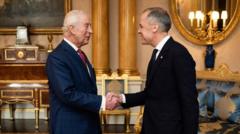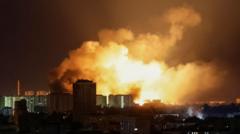Since the U.S. lifted sanctions against Syria, Israeli airstrikes in the country have significantly decreased, jeopardizing its previous military strategy.
Trump's Shift on Syria Reshapes Israeli Military Tactics

Trump's Shift on Syria Reshapes Israeli Military Tactics
President Trump's new approach towards Syria has dramatically altered Israel's military operations in the region.
---
Israeli military strategy has faced substantial changes in light of recent U.S. policy shifts towards Syria under President Trump. With sanctions lifted against President Ahmed al-Shara's government, Israeli airstrikes have dramatically reduced—marking a stark contrast to earlier aggressive military actions that numbered over 700 since the fall of Bashar al-Assad.
Following a significant airstrike on May 2, which approached close to the presidential palace in Damascus, Trump’s unexpected pivot during his May 14 meeting with al-Shara has been interpreted as a departure from longstanding American foreign policy. The Israeli government, which viewed al-Shara’s regime as extremist, had aimed to prevent hostile groups from proliferating near its borders and learned harsh lessons from previous conflicts in southern Lebanon.
Former national security adviser Uzi Arad acknowledged the changes, stating that Israel's operations must adapt to this new diplomatic landscape, as the previous objective of limiting weapons distribution to hostile factions appears compromised.
In the wake of Trump's endorsement, there has been a public display of gratitude in Syria, showcased by billboards thanking him and Saudi Crown Prince Mohammed bin Salman for the policy shift. As a result, the Israeli military faces a recalibrated strategy, potentially limiting its operational effectiveness in the region amidst Trump's evolving stance.
Israeli military strategy has faced substantial changes in light of recent U.S. policy shifts towards Syria under President Trump. With sanctions lifted against President Ahmed al-Shara's government, Israeli airstrikes have dramatically reduced—marking a stark contrast to earlier aggressive military actions that numbered over 700 since the fall of Bashar al-Assad.
Following a significant airstrike on May 2, which approached close to the presidential palace in Damascus, Trump’s unexpected pivot during his May 14 meeting with al-Shara has been interpreted as a departure from longstanding American foreign policy. The Israeli government, which viewed al-Shara’s regime as extremist, had aimed to prevent hostile groups from proliferating near its borders and learned harsh lessons from previous conflicts in southern Lebanon.
Former national security adviser Uzi Arad acknowledged the changes, stating that Israel's operations must adapt to this new diplomatic landscape, as the previous objective of limiting weapons distribution to hostile factions appears compromised.
In the wake of Trump's endorsement, there has been a public display of gratitude in Syria, showcased by billboards thanking him and Saudi Crown Prince Mohammed bin Salman for the policy shift. As a result, the Israeli military faces a recalibrated strategy, potentially limiting its operational effectiveness in the region amidst Trump's evolving stance.




















